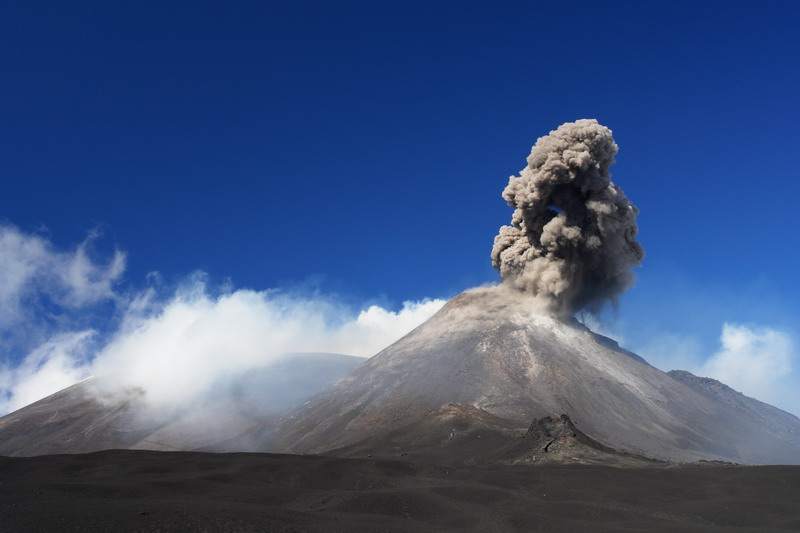6299, RE: volcano – вулкан
Послано pl, 20-11-2016 23:05
volcano – вулкан
volcano (n.) (из итальянского «vulcano» - пылающая гора); из латинского «Vulcanus» - Вулкан, римский бог огня; изначально относилось к горе Этна
1610s, from Italian vulcano "burning mountain," from Latin Vulcanus "Vulcan," Roman god of fire, also "fire, flames, volcano" (see Vulcan). The name was first applied to Mt. Etna by the Romans, who believed it was the forge of Vulcan. Earlier form in English was volcan (1570s), from French.
Vulcan (n.) (бог огня и работы с металлом у древних римлян); из латинского «Vulcanus, Volcanus» этрусского происхождения
god of fire and metal-work in Roman mythology, 1510s, from Latin Vulcanus, Volcanus, according to Klein a word of Etruscan origin. Often with allusions to his lameness and the unfaithfulness of his wife, Venus. As the name of a hypothetical planet between Mercury and the Sun, it is attested from 1860 in English
1675:
VULCAN (Vulcanus, L.) – бог у язычников, бог подземного огня, начальствующий над металлами, сын Юпитера и Юноны. VULCANO (volcano, Ital., Vulcanus, L. – знаменитый бог огня) – пылающая гора, которая извергает пламя, дым и пепел, такая, как Этна
Странно, почему не Везувий.
Облако – БЛК – BLC (N) или «облачная»
Кстати, ближайшее сильное извержение – 1669
http://www.swisseduc.ch/stromboli/etna/etna00/etna0002photovideo-en.html?id=4
«Вики»
According to Adrian Room’s book Place-names of the World, the name Etna originated from the Phoenician word attuna meaning "furnace" or "chimney". He dismisses the hypothesis that Etna is from the Greek αἴθω (aithō), meaning "I burn", through an iotacist pronunciation.<7> In Classical Greek, it is called Αἴτνη (Aítnē),<8> a name given also to Catania and the city originally known as Inessa, and in Latin it is called Aetna. In Arabic, it was called جبل النار Jabal al-Nār (the Mountain of Fire).<9>
It is also known as Mungibeddu in Sicilian and Mongibello or Montebello in Italian (The Italian word literally meaning Monte mountain and Bello meaning beautiful, but the Sicilian word is actually thought to be from the Latin mons and the Arabic جبل jabal, both meaning mountain, producing a tautological place name, "mountain mountain").<10> The term is not in common use today, although some older people still call it this. According to another hypothesis the term Mongibello comes from the Latin Mulciber (qui ignem mulcet, who placates the fire), one of the Latin names of the Roman god Vulcan.
Название вулкана Этна происходит от финикийского «attuna» означающего «печь, топка, дымовая труба», так же из греческого «αἴθω» - горю, в классическом греческом – «Αἴτνη», у латинян – «Aetna», у арабов – «Огненная гора» - جبل النار Jabal al-Nār. Так же известна у сицилийцев, как Mungibeddu, а у итальянцев, как Mongibello or Montebello, где соединились латинское «mons» - гора, т.е. «камень», см. «mountain» и арабское jabal, что тоже означает «гора» (как по мне, то это русское «горб» - ГРБ – JRB – JBL, ср. «Карпаты» - Дунаев); сейчас это название помнят только старожилы; по другой версии, ороним Mongibello происходит из латинского «qui ignem mulcet» - успокаивающий огонь, одно из наименований бога Вулкана.
Видимо, изначально название связано с темнотой, дымом, ср. гр. ἀτμός – пар. Звукоподражательное «дую» - дым, тьма. Так что облако сюда вполне укладывается. Кстати, чем не нравиться этимологам «белый камень»? Montebello, ср. Monte bianca (итал.), Mont Blanc (фр.) – «камень» + «белянка».

|
